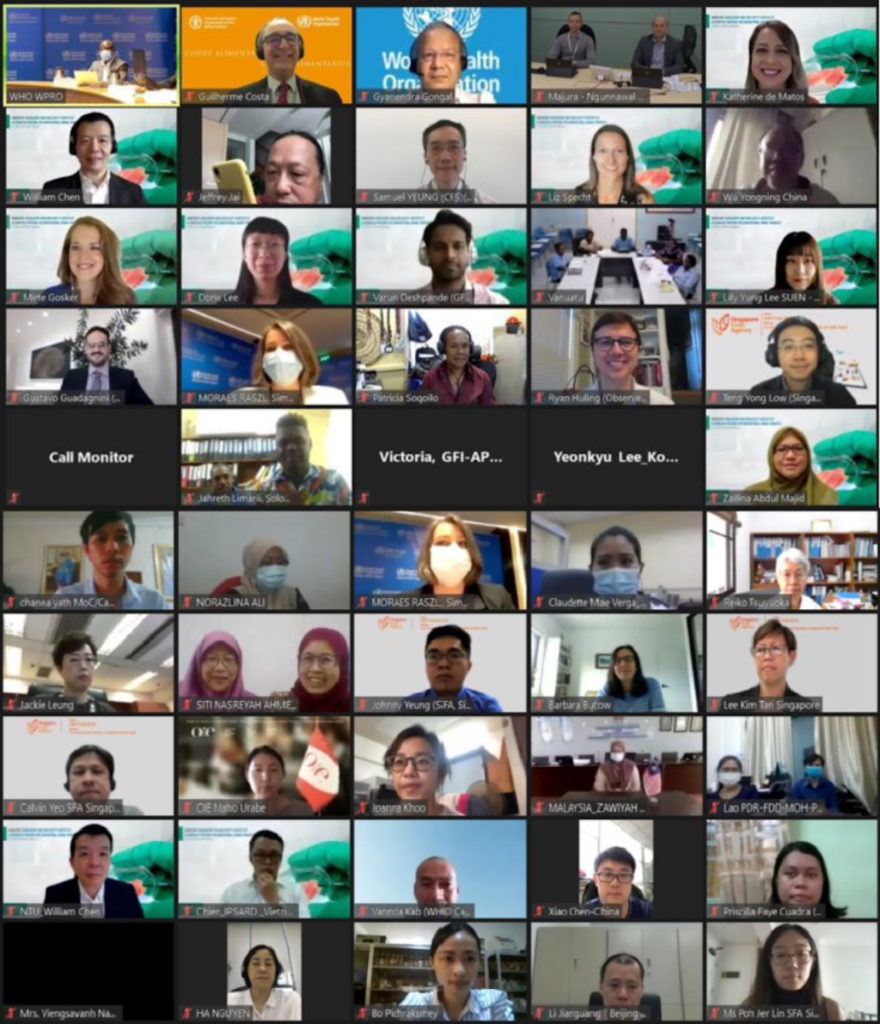WHO x GFI Discuss The Future Of Food: First Joint Alt Protein Workshop Covers Global Regulation & Food Safety
5 Mins Read
The World Health Organisation (WHO) and Good Food Institute (GFI) have teamed up to host a workshop on alternative protein regulations and food safety for the first time. Led by the WHO’s Regional Office for the Western Pacific (WPRO) and GFI’s global network, the two-day event discussed crucial alternative protein challenges and opportunities, from the safety hurdles for cultivated meat to reach the market to consumer insights on existing plant-based products.
For the first time, the WHO WPRO and global affiliates of nonprofit GFI have come together to host a two-day workshop centred on the development of global regulations of alternative proteins and key questions about food safety. Whilst the industry has undergone rapid growth in the last few years, recording a tripling in global investment in 2020 amid the pandemic, existing standards around the world have yet to catch up.
The virtual workshop, titled “Regulatory and Food Safety Aspects of Alternative Proteins for Conventional Animal Products” set out to tackle this issue and saw attendees from across Asia-Pacific join multiple technical sessions featuring experts including Dr. Katherine de Matos from GFI Brazil and Dr. Liz Specht at GFI U.S. among many others.
“Current regulations for alternative proteins lag behind consumer demand and few standardised best practices or technical recommendations for consistent international regulation have so far been established,” wrote Ryan Huling, head of communications and programs at GFI APAC, in a summary of the event.

“A strong regulatory framework is critical to further advancing the sector and maximising its potential to improve food security, mitigate environmental degradation, and alleviate global poverty.”
Speaking to Green Queen Media about the event, GFI India managing director Varun Deshpande said: “Alternative protein has the potential to transform global food systems for the radically better, and governments must keep pace with and throw their weight behind this transformative food innovation.”
“It is hugely heartening to see senior leadership from the WHO and their regional offices take a keen interest in charting a regulatory path to market for the sector. GFI’s global network of nonprofits is delighted to partner with them on this workshop, and on future initiatives advancing food security and safety, and pushing back against malnutrition and climate change.”
Key topics such as cultivated meat food safety considerations, research about consumer attitudes of novel sustainable proteins and scientific overviews of plant-based and microbial fermentation proteins were discussed over the course of the workshop.
Countries need to be able to count on alternative technology for mass industrial production of safe, healthy, protein-rich food in a sustainable and environmentally-friendly way.
Dr. Takeshi Kasai, Regional Director, WPRO
It also featured a case study of the regulatory process of the Singapore food safety authorities, who became the world’s first – and to date the only agency – to approve cultured meat for commercial sale in December 2020. In addition to being served at restaurants, Eat Just’s cell-based chicken is now also available on food delivery platform Foodpanda.
Singapore’s forward-thinking approach to regulation over alternative protein is part of the city-state’s goal to boost local food production to 30%, which feeds into its ambitious S$100 billion (US$72 billion) plan to adapt to a climate-stricken future.

In the wake of the pandemic and related supply chain disruptions, the country has set aside extra investment dedicated to sustainable food production, a move many credit for Singapore’s lead in food and agri-tech innovation.
Since approving cultured meat for sale, the Singapore Food Agency (SFA) has urged alternative protein firms around the world to apply early for regulatory approval for novel food products like cell-based proteins, attracting a number of food techs to set up base in the island – including Hong Kong cell-based seafood maker Avant Meats and Californian precision fermentation player Perfect Day.
SFA has also launched a new “FRESH” hub dedicated to drive novel food safety research and expedite rules.
During the workshop, SFA deputy director of regulatory policy Low Teng Yong explained that it is a top focus for Singapore to “diversify our food sources to ensure that our supply is resilient to fluctuations.”

Adapting your regulatory frameworks to include new foods is essential to protect consumer sales and make alternative and nutritious food available.
Dr. Babatunde Olowokure, Director, Division of Health Security and Emergencies, WPRO
Experts from WHO WPRO emphasised over the course of the two-day workshop that there is simply no time to lose when it comes to fixing the unsustainable protein supply chain, for both planetary and human health.
“It’s about the food, but…there are so many implications to other sectors,” said Dr. Takeshi Kasai, regional director of the WPRO. “Countries need to be able to count on alternative technology for mass industrial production of safe, healthy, protein-rich food in a sustainable and environmentally-friendly way.”
“The possibility of producing alternative meat without slaughtering animals carries an obvious benefit. As does the availability of a meat product with a much-reduced environmental impact and reduced health concerns linked with emergence of novel diseases at the animal-human-environment interface,” added Dr. Babatunde Olowokure, director of the WPRO’s Division of Health Security and Emergencies.
“Adapting your regulatory frameworks to include new foods is essential to protect consumer sales and make alternative and nutritious food available.”
Lead image courtesy of Wildtype.




